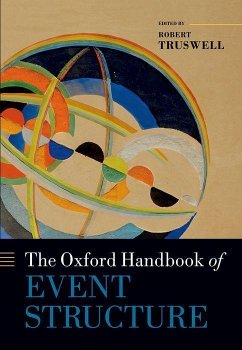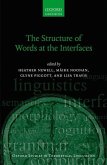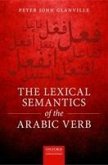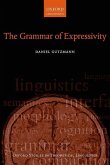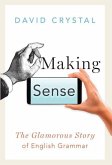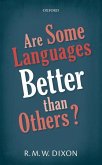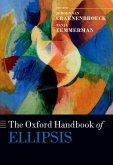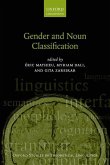The Oxford Handbook of Event Structure
Herausgeber: Truswell, Robert
The Oxford Handbook of Event Structure
Herausgeber: Truswell, Robert
- Broschiertes Buch
- Merkliste
- Auf die Merkliste
- Bewerten Bewerten
- Teilen
- Produkt teilen
- Produkterinnerung
- Produkterinnerung
This handbook explores what events are, how we perceive them, how we use language to describe them, how we reason with them, and the role they play in the organization of grammar and discourse. It takes an interdisciplinary approach with insights from linguistics, philosophy, psychology, cognitive science, and computer science.
Andere Kunden interessierten sich auch für
![The Structure of Words at the Interfaces The Structure of Words at the Interfaces]() The Structure of Words at the Interfaces79,99 €
The Structure of Words at the Interfaces79,99 €![The Lexical Semantics of the Arabic Verb The Lexical Semantics of the Arabic Verb]() Peter John GlanvilleThe Lexical Semantics of the Arabic Verb68,99 €
Peter John GlanvilleThe Lexical Semantics of the Arabic Verb68,99 €![The Grammar of Expressivity The Grammar of Expressivity]() Daniel GutzmannThe Grammar of Expressivity66,99 €
Daniel GutzmannThe Grammar of Expressivity66,99 €![Making Sense Making Sense]() David CrystalMaking Sense28,99 €
David CrystalMaking Sense28,99 €![Are Some Languages Better Than Others? Are Some Languages Better Than Others?]() R M W DixonAre Some Languages Better Than Others?40,99 €
R M W DixonAre Some Languages Better Than Others?40,99 €![The Oxford Handbook of Ellipsis The Oxford Handbook of Ellipsis]() The Oxford Handbook of Ellipsis63,99 €
The Oxford Handbook of Ellipsis63,99 €![Gender and Noun Classification Gender and Noun Classification]() Gender and Noun Classification73,99 €
Gender and Noun Classification73,99 €-
-
-
This handbook explores what events are, how we perceive them, how we use language to describe them, how we reason with them, and the role they play in the organization of grammar and discourse. It takes an interdisciplinary approach with insights from linguistics, philosophy, psychology, cognitive science, and computer science.
Hinweis: Dieser Artikel kann nur an eine deutsche Lieferadresse ausgeliefert werden.
Hinweis: Dieser Artikel kann nur an eine deutsche Lieferadresse ausgeliefert werden.
Produktdetails
- Produktdetails
- Verlag: Oxford University Press
- Seitenzahl: 736
- Erscheinungstermin: 25. Oktober 2021
- Englisch
- Abmessung: 175mm x 249mm x 41mm
- Gewicht: 1247g
- ISBN-13: 9780192845221
- ISBN-10: 0192845225
- Artikelnr.: 62220464
- Herstellerkennzeichnung
- Libri GmbH
- Europaallee 1
- 36244 Bad Hersfeld
- gpsr@libri.de
- Verlag: Oxford University Press
- Seitenzahl: 736
- Erscheinungstermin: 25. Oktober 2021
- Englisch
- Abmessung: 175mm x 249mm x 41mm
- Gewicht: 1247g
- ISBN-13: 9780192845221
- ISBN-10: 0192845225
- Artikelnr.: 62220464
- Herstellerkennzeichnung
- Libri GmbH
- Europaallee 1
- 36244 Bad Hersfeld
- gpsr@libri.de
Robert Truswell is a Senior Lecturer in Linguistics and English Language at the University of Edinburgh, and Adjunct Professor in Linguistics at the University of Ottawa, where he was Assistant Professor from 2011-14. He works on many aspects of syntax, semantics, and their interface, as well as syntactic and semantic change, and topics related to the evolution of language. His previous publications include the monograph Events, Phrases, and Questions (OUP, 2011), and the edited volumes Syntax and its Limits (OUP, 2014, with Raffaella Folli and Christina Sevdali) and Micro-change and Macro-change in Diachronic Syntax (OUP, 2017, with Éric Mathieu). He is the co-author, with Daniel Altshuler, of Extraction from Coordinate Structures at the Syntax-Discourse Interface (forthcoming from OUP).
* 1: Robert Truswell: Introduction
* Part I: Events and Natural Language Metaphysics
* 2: Anita Mittwoch: Aspectual classes
* 3: Claudia Maienborn: Events and states
* 4: Robert Truswell: Event composition and event individuation
* 5: Richmond H. Thomason: The semantic representation of causation and
agentivity
* 6: Bridget Copley: Force dynamics
* 7: Henk J. Verkuyl: Event structure without naïve physics
* 8: Berit Gehrke: Event kinds
* Part II: Events in Morphosyntax and Lexical Semantics
* 9: Nikolas Gisborne and James Donaldson: Thematic roles and events
* 10: Lisa Levinson: Semantic domains for syntactic word-building
* 11: Terje Lohndal: Neodavidsonianism in semantics and syntax
* 12: Gillian Ramchand: Event structure and verbal decomposition
* 13: Friederike Moltmann: Nominals and event structure
* 14: Rebekah Baglini and Chris Kennedy: Adjectives and event structure
* Part III: Crosslinguistic Perspectives
* 15: Beth Levin and Malka Rappaport Hovav: Lexicalization patterns
* 16: Tova Rapoport: Secondary predication
* 17: Tal Siloni: Event structure and syntax
* 18: Lisa deMena Travis: Inner aspect crosslinguistically
* Part IV: Events, Cognition, and Computation
* 19: Hans Kamp: Tense and aspect in Discourse Representation Theory
* 20: Andrew Kehler: Coherence relations
* 21: Mark Steedman: Form-independent meaning-representation for
eventualities
* 22: Neil Cohn and Martin Paczynski: The neurophysiology of event
processing in language and visual events
* Part I: Events and Natural Language Metaphysics
* 2: Anita Mittwoch: Aspectual classes
* 3: Claudia Maienborn: Events and states
* 4: Robert Truswell: Event composition and event individuation
* 5: Richmond H. Thomason: The semantic representation of causation and
agentivity
* 6: Bridget Copley: Force dynamics
* 7: Henk J. Verkuyl: Event structure without naïve physics
* 8: Berit Gehrke: Event kinds
* Part II: Events in Morphosyntax and Lexical Semantics
* 9: Nikolas Gisborne and James Donaldson: Thematic roles and events
* 10: Lisa Levinson: Semantic domains for syntactic word-building
* 11: Terje Lohndal: Neodavidsonianism in semantics and syntax
* 12: Gillian Ramchand: Event structure and verbal decomposition
* 13: Friederike Moltmann: Nominals and event structure
* 14: Rebekah Baglini and Chris Kennedy: Adjectives and event structure
* Part III: Crosslinguistic Perspectives
* 15: Beth Levin and Malka Rappaport Hovav: Lexicalization patterns
* 16: Tova Rapoport: Secondary predication
* 17: Tal Siloni: Event structure and syntax
* 18: Lisa deMena Travis: Inner aspect crosslinguistically
* Part IV: Events, Cognition, and Computation
* 19: Hans Kamp: Tense and aspect in Discourse Representation Theory
* 20: Andrew Kehler: Coherence relations
* 21: Mark Steedman: Form-independent meaning-representation for
eventualities
* 22: Neil Cohn and Martin Paczynski: The neurophysiology of event
processing in language and visual events
* 1: Robert Truswell: Introduction
* Part I: Events and Natural Language Metaphysics
* 2: Anita Mittwoch: Aspectual classes
* 3: Claudia Maienborn: Events and states
* 4: Robert Truswell: Event composition and event individuation
* 5: Richmond H. Thomason: The semantic representation of causation and
agentivity
* 6: Bridget Copley: Force dynamics
* 7: Henk J. Verkuyl: Event structure without naïve physics
* 8: Berit Gehrke: Event kinds
* Part II: Events in Morphosyntax and Lexical Semantics
* 9: Nikolas Gisborne and James Donaldson: Thematic roles and events
* 10: Lisa Levinson: Semantic domains for syntactic word-building
* 11: Terje Lohndal: Neodavidsonianism in semantics and syntax
* 12: Gillian Ramchand: Event structure and verbal decomposition
* 13: Friederike Moltmann: Nominals and event structure
* 14: Rebekah Baglini and Chris Kennedy: Adjectives and event structure
* Part III: Crosslinguistic Perspectives
* 15: Beth Levin and Malka Rappaport Hovav: Lexicalization patterns
* 16: Tova Rapoport: Secondary predication
* 17: Tal Siloni: Event structure and syntax
* 18: Lisa deMena Travis: Inner aspect crosslinguistically
* Part IV: Events, Cognition, and Computation
* 19: Hans Kamp: Tense and aspect in Discourse Representation Theory
* 20: Andrew Kehler: Coherence relations
* 21: Mark Steedman: Form-independent meaning-representation for
eventualities
* 22: Neil Cohn and Martin Paczynski: The neurophysiology of event
processing in language and visual events
* Part I: Events and Natural Language Metaphysics
* 2: Anita Mittwoch: Aspectual classes
* 3: Claudia Maienborn: Events and states
* 4: Robert Truswell: Event composition and event individuation
* 5: Richmond H. Thomason: The semantic representation of causation and
agentivity
* 6: Bridget Copley: Force dynamics
* 7: Henk J. Verkuyl: Event structure without naïve physics
* 8: Berit Gehrke: Event kinds
* Part II: Events in Morphosyntax and Lexical Semantics
* 9: Nikolas Gisborne and James Donaldson: Thematic roles and events
* 10: Lisa Levinson: Semantic domains for syntactic word-building
* 11: Terje Lohndal: Neodavidsonianism in semantics and syntax
* 12: Gillian Ramchand: Event structure and verbal decomposition
* 13: Friederike Moltmann: Nominals and event structure
* 14: Rebekah Baglini and Chris Kennedy: Adjectives and event structure
* Part III: Crosslinguistic Perspectives
* 15: Beth Levin and Malka Rappaport Hovav: Lexicalization patterns
* 16: Tova Rapoport: Secondary predication
* 17: Tal Siloni: Event structure and syntax
* 18: Lisa deMena Travis: Inner aspect crosslinguistically
* Part IV: Events, Cognition, and Computation
* 19: Hans Kamp: Tense and aspect in Discourse Representation Theory
* 20: Andrew Kehler: Coherence relations
* 21: Mark Steedman: Form-independent meaning-representation for
eventualities
* 22: Neil Cohn and Martin Paczynski: The neurophysiology of event
processing in language and visual events

